Brain teasers can effectively quiet an anxious mind by redirecting your focus to engaging puzzles. Sudoku challenges your logical thinking with number grids, while crosswords expand your vocabulary. Riddles encourage lateral thinking, and logic puzzles provide structured problem-solving. For spatial reasoning, try tangrams or navigate through mazes. Pattern recognition exercises sharpen your observational skills, and mathematical brain teasers offer number-based challenges. Spot-the-difference games train your eye for detail. These activities not only distract from anxious thoughts but also improve cognitive skills and boost confidence. Explore these options to discover which teaser best soothes your mind.
Sudoku: Numbers for Mental Clarity
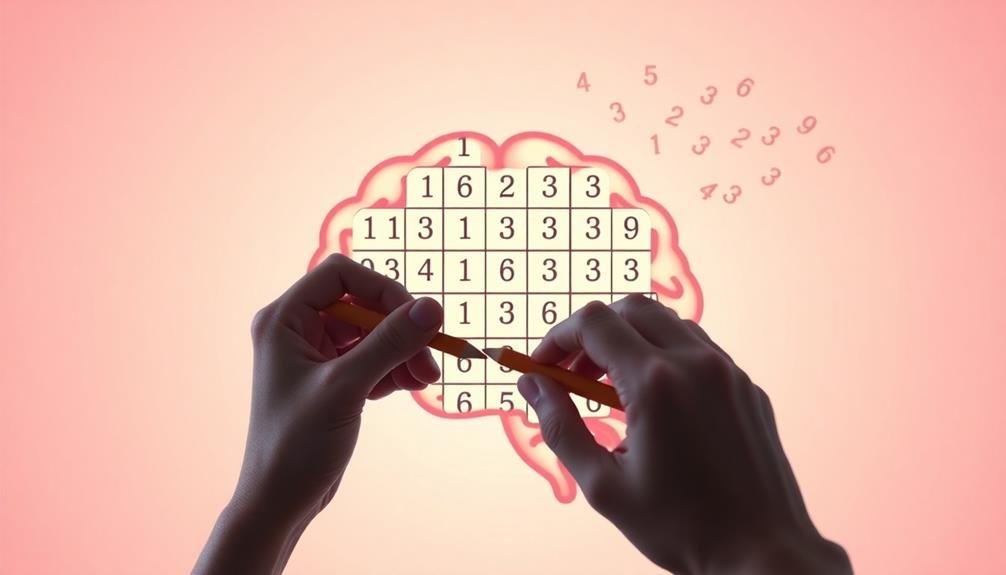
In recent years, Sudoku has emerged as a popular brain teaser for those seeking mental clarity. This number-placement puzzle challenges you to fill a 9×9 grid with digits so that each column, row, and 3×3 sub-grid contains all numbers from 1 to 9. As you focus on solving the puzzle, your anxious thoughts fade into the background.
Sudoku's appeal lies in its logical nature. You'll find yourself engrossed in analyzing patterns and possibilities, leaving little room for worry. The puzzle's structure provides a sense of order and control, which can be comforting when you're feeling overwhelmed.
As you progress, you'll experience small victories with each correctly placed number, boosting your confidence and mood.
You don't need to be a math whiz to enjoy Sudoku. It's about logic, not calculation. Start with easier puzzles and work your way up. You'll soon notice improvements in your concentration and problem-solving skills.
Many find that regular Sudoku practice helps them approach real-life challenges with a clearer mind. So, next time anxiety creeps in, grab a Sudoku puzzle and let the numbers guide you to a calmer state of mind.
Crossword Puzzles: Word-Focused Distraction
Crossword puzzles offer you a unique opportunity to expand your vocabulary while engaging your mind in focused problem-solving.
You'll encounter words you may not use in everyday conversation, broadening your linguistic horizons. As you work through the clues, you're fully immersed in the task, providing a welcome distraction from anxious thoughts.
Vocabulary Expansion Opportunities
Frequently overlooked, crossword puzzles offer an excellent opportunity for vocabulary expansion while providing a word-focused distraction from anxiety. As you engage with these puzzles, you'll encounter unfamiliar words and phrases, prompting you to explore their meanings and origins.
By regularly solving crosswords, you'll naturally build your vocabulary without the pressure of formal study. You'll learn new synonyms, antonyms, and idiomatic expressions, enhancing your language skills in a fun, low-stress environment. This knowledge accumulation can boost your confidence in communication and writing.
Crosswords often include words from various fields, such as science, literature, and pop culture. This broad exposure can spark your curiosity and lead to further learning in diverse subjects. You'll also improve your spelling skills as you carefully consider each letter placement.
To maximize vocabulary growth, keep a notebook handy to jot down new words you encounter. Look up their definitions and try using them in sentences. Over time, you'll notice your vocabulary expanding, giving you a sense of accomplishment and providing a constructive outlet for your anxious energy.
Focused Mental Engagement
Engaging in crossword puzzles offers a powerful form of focused mental engagement that can help alleviate anxiety. As you immerse yourself in the grid of black and white squares, your mind naturally shifts away from worrisome thoughts and toward the task at hand. You'll find yourself fully absorbed in deciphering clues, recalling vocabulary, and fitting words into the puzzle's structure.
This mental concentration acts as a form of cognitive distraction, redirecting your brain's energy from anxious rumination to problem-solving. You're forced to think laterally, make connections, and draw upon your knowledge base. The act of filling in each blank space provides a sense of accomplishment, boosting your confidence with each correct answer.
Moreover, crosswords offer a structured challenge with clear boundaries. Unlike the often ambiguous nature of anxiety-inducing situations, puzzles present a defined problem with a definite solution. This certainty can be comforting, giving you a sense of control and predictability.
As you progress through the puzzle, you're engaging in a form of mindfulness, staying present and focused on the immediate task rather than dwelling on future uncertainties or past regrets.
Riddles: Engage in Lateral Thinking

As you explore the world of brain teasers, riddles stand out as an excellent way to challenge your mind and reduce anxiety. These puzzles require lateral thinking, forcing you to approach problems from unconventional angles. By engaging with riddles, you're training your brain to be more flexible and creative in its problem-solving approach.
Riddles come in various forms, from classic word puzzles to logic-based conundrums. They often rely on wordplay, double meanings, or unexpected connections between seemingly unrelated concepts. As you work through these puzzles, you'll find yourself thinking outside the box and considering multiple perspectives.
The process of solving riddles can be particularly beneficial for anxiety reduction. It shifts your focus away from worry-inducing thoughts and onto a specific, solvable challenge. This mental redirection can provide a welcome respite from anxious rumination.
Moreover, the satisfaction of solving a riddle triggers a release of dopamine, the brain's reward chemical. This positive reinforcement can boost your mood and confidence, further counteracting anxiety.
Start with simpler riddles and gradually increase the difficulty to maintain a sense of challenge and accomplishment.
Logic Puzzles: Structured Problem-Solving
Logic puzzles offer a structured approach to problem-solving that can be particularly soothing for an anxious mind. These puzzles typically present you with a set of clues or constraints, requiring you to use deductive reasoning to arrive at a solution. As you work through the puzzle, you'll find your mind focusing on the task at hand, temporarily quieting anxious thoughts.
One popular type of logic puzzle is the grid puzzle, where you're given a set of categories and must determine the correct relationships between them. Here's a simple example:
| Name | Age | Pet |
|---|---|---|
| John | 25 | Dog |
| Sara | 30 | Cat |
| Mike | 35 | Fish |
To solve this puzzle, you'd use the given clues to fill in the grid correctly.
Other types of logic puzzles include Sudoku, which challenges you to fill a 9×9 grid with numbers, and syllogisms, where you're presented with premises and must draw valid conclusions. By engaging with these puzzles, you're not only distracting yourself from anxiety but also strengthening your analytical skills and building confidence in your ability to solve complex problems.
Tangrams: Spatial Reasoning Challenge
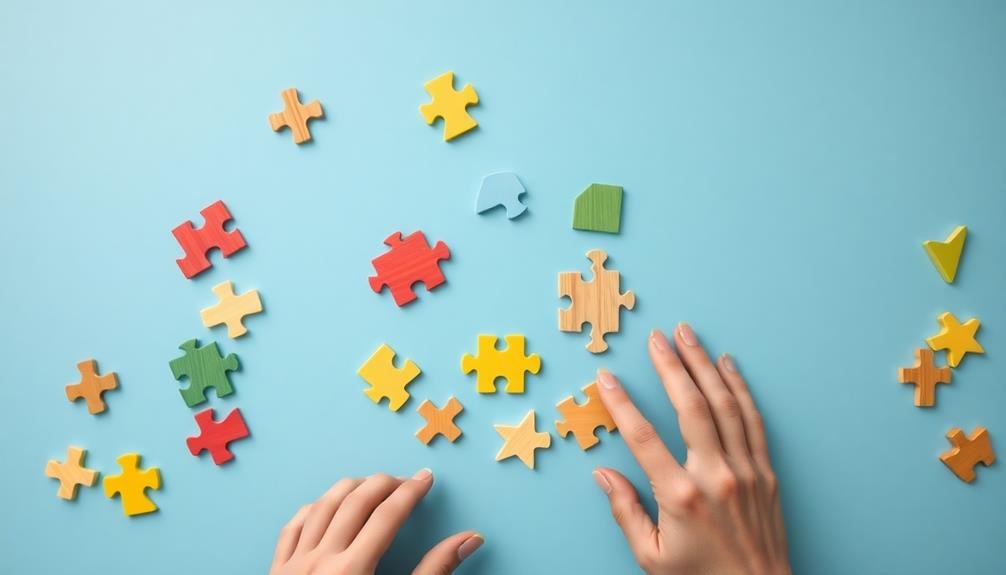
Tangrams, the ancient Chinese puzzle game, offers a unique spatial reasoning challenge that can captivate an anxious mind. You'll find yourself engrossed in manipulating seven simple geometric shapes to create complex silhouettes. As you rotate, flip, and rearrange the pieces, your brain shifts its focus from worry to problem-solving.
The beauty of tangrams lies in their simplicity and versatility. You can start with easy patterns and gradually progress to more intricate designs. This sense of accomplishment can boost your confidence and provide a welcome distraction from anxious thoughts.
The tactile nature of the game also adds a grounding element, keeping you present in the moment. Tangrams improve your spatial awareness and visual-motor skills, which can have practical benefits in daily life. You'll find yourself better at organizing spaces, packing efficiently, and even reading maps.
The game's open-ended nature allows for endless creativity, letting you design your own shapes when you're not following preset patterns. This creative outlet can be particularly soothing for an anxious mind, providing a sense of control and expression.
Rubik's Cube: Hands-On Focus
The iconic Rubik's Cube offers a hands-on challenge that can captivate your anxious mind for hours on end. As you twist and turn the colorful squares, you'll find yourself fully absorbed in the puzzle, leaving little room for anxious thoughts. The cube's physical nature engages your tactile senses, grounding you in the present moment.
Learning to solve the Rubik's Cube involves memorizing algorithms and developing muscle memory. This process of repetition and practice can be soothing, providing a sense of control and accomplishment. As you progress, you'll notice improvements in your spatial awareness and problem-solving skills.
The cube's complexity offers various levels of engagement. You can start with solving a single face, then work your way up to more advanced techniques. There's always room for improvement, whether you're aiming to solve it faster or master new methods.
When anxiety strikes, reaching for your Rubik's Cube can provide an immediate distraction. The focused concentration required to manipulate the cube helps redirect your thoughts, potentially alleviating anxiety symptoms.
Plus, the satisfaction of solving the puzzle can boost your mood and self-confidence.
Memory Games: Concentration Builders

With the power to sharpen focus and calm an anxious mind, memory games serve as excellent concentration builders. These games challenge you to recall patterns, sequences, or information, effectively redirecting your thoughts away from anxiety-inducing concerns.
Start with classic games like Simon, where you'll repeat increasingly complex sequences of colors and sounds. This game improves your short-term memory and attention span.
For a digital option, try Lumosity's memory games, which adapt to your skill level and provide progress tracking.
Card-matching games, such as Concentration, can be played solo or with others. They'll test your visual memory and spatial awareness while promoting relaxation through repetitive actions.
To up the ante, try speed-based memory games like Memory Matrix, which push you to recall patterns quickly.
For on-the-go options, download apps like Elevate or Peak. These offer a variety of memory exercises that you can tackle during spare moments, helping to refocus your mind when anxiety strikes.
Optical Illusions: Visual Perception Shift
Optical illusions can shake up your perspective and shift your focus away from anxious thoughts. These visual puzzles challenge your brain's perception, forcing it to recalibrate and interpret information differently. By engaging with optical illusions, you're training your mind to be more flexible and adaptable, which can help alleviate anxiety symptoms.
Try these popular optical illusions to give your brain a workout:
| Illusion Type | Description |
|---|---|
| Ambiguous Figures | Images that can be interpreted in multiple ways |
| Motion Illusions | Static images that appear to move |
| Color Illusions | Tricks involving color perception |
| Size Illusions | Objects that seem larger or smaller than they are |
As you explore these illusions, you'll notice your mind becoming more engaged and less focused on anxious thoughts. The process of decoding visual information can be both challenging and rewarding, providing a healthy distraction from worry. Additionally, the "aha" moment when you finally see an illusion differently can boost your mood and confidence. Incorporate optical illusions into your daily routine as a quick mental break or use them as a tool to refocus your mind when anxiety starts to creep in.
Anagrams: Letter Rearrangement Fun
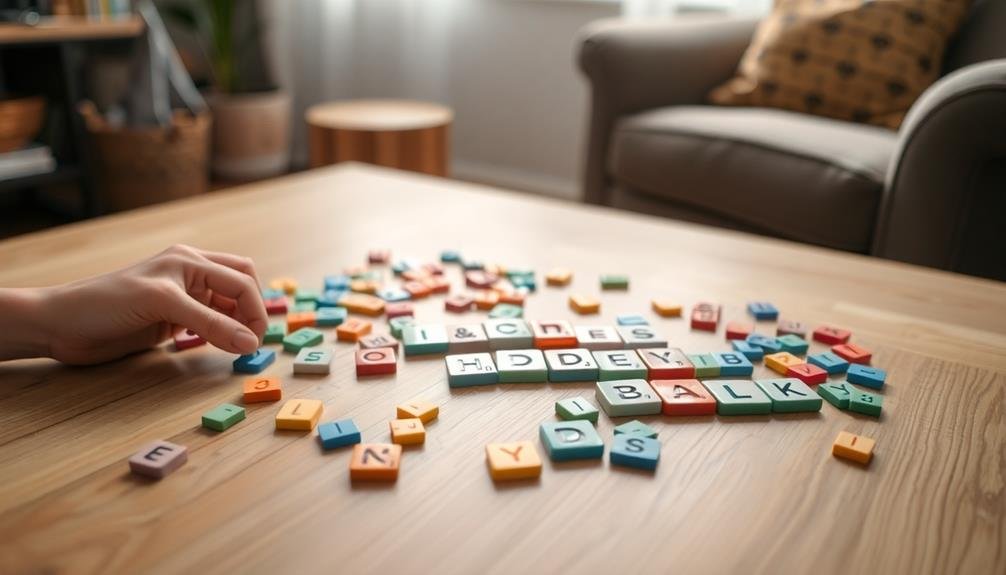
Anagrams offer a delightful way to challenge your mind and shift focus from anxious thoughts. These word puzzles involve rearranging letters to form new words or phrases, engaging your brain in a stimulating exercise. You'll find yourself absorbed in unscrambling letters, momentarily forgetting your worries.
Start with simple anagrams, like "silent" to "listen" or "earth" to "heart." As you gain confidence, tackle more complex ones. Try "astronomer" to "moon starer" or "debit card" to "bad credit." You can even create anagrams from your name or favorite phrases.
To solve anagrams efficiently, look for common letter combinations or word endings. Group similar letters together and experiment with different arrangements. Don't be afraid to use pen and paper to visualize possibilities.
Anagrams aren't just solo activities; you can turn them into group games. Challenge friends or family members to solve anagrams together, fostering a sense of community and shared accomplishment.
Online anagram generators can provide endless puzzles, ensuring you always have a fresh challenge at your fingertips.
Mazes: Pathfinding for Mindfulness
Mazes offer a unique form of mental exercise that can help soothe an anxious mind. As you navigate through intricate paths, your focus shifts from worries to problem-solving, promoting a sense of calm and accomplishment. Start with simpler mazes and gradually increase the complexity to challenge yourself without becoming overwhelmed.
You'll find various types of mazes to explore, each with its own benefits. Traditional 2D mazes on paper or digital screens can be easily accessed and completed anywhere. 3D mazes, whether physical or virtual, add depth and spatial reasoning to the experience. For a more immersive challenge, try hedge mazes in gardens or corn mazes during autumn festivals.
To maximize the mindfulness aspect, approach maze-solving methodically. Take deep breaths before beginning, and maintain steady breathing throughout. As you trace potential paths, stay present in the moment, observing your thoughts without judgment.
If you encounter dead ends, view them as opportunities to learn rather than failures. Remember, the goal isn't just reaching the end but enjoying the journey and quieting your mind along the way.
Pattern Recognition: Sequence Spotting
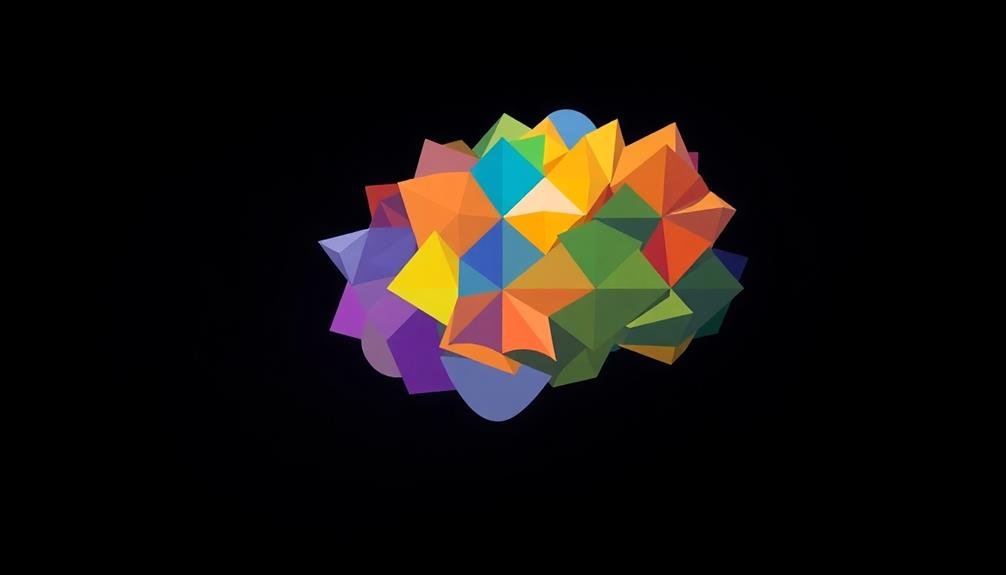
Countless patterns surround us in daily life, and recognizing them can be a powerful tool for calming an anxious mind. By focusing on sequence spotting, you're engaging your brain in a structured activity that can help redirect anxious thoughts.
Pattern recognition exercises challenge you to identify recurring elements or rules within a set of data, images, or numbers.
To get started with pattern recognition brain teasers, try these engaging activities:
- Complete number sequences (e.g., 2, 4, 8, 16, ?)
- Identify the next shape in a visual pattern
- Solve letter sequences (e.g., A, C, E, G, ?)
- Spot patterns in word puzzles or riddles
As you practice these exercises, you'll find your mind becoming more attuned to patterns in your environment. This heightened awareness can help you break down complex problems into manageable parts, reducing anxiety about overwhelming situations.
Additionally, the sense of accomplishment you'll feel when solving pattern-based puzzles can boost your confidence and provide a much-needed distraction from anxious thoughts.
Mathematical Brain Teasers: Number Play
Numbers are powerful tools for engaging an anxious mind, offering a structured playground for mathematical exploration. When you're feeling overwhelmed, try these number-based brain teasers to redirect your focus and calm your thoughts.
Start with simple arithmetic puzzles, like finding missing numbers in equations or solving for variables. Then, progress to more complex challenges such as Sudoku or KenKen puzzles, which require logical thinking and pattern recognition.
For a fun twist, explore number sequences. Try to identify the rule behind a series of numbers and predict the next in line. This exercise sharpens your analytical skills while providing a satisfying sense of accomplishment.
Here's a table of number-based brain teasers to get you started:
| Puzzle Type | Example | Difficulty |
|---|---|---|
| Missing Number | 3 + ? = 10 | Easy |
| Sequence | 2, 4, 8, 16, ? | Medium |
| Sudoku | 9×9 grid | Variable |
| KenKen | 6×6 grid | Challenging |
| Magic Square | 3×3 sum 15 | Advanced |
Spot the Difference: Detail-Oriented Observation

While number puzzles engage your analytical skills, visual challenges can be equally effective in calming an anxious mind. Spot the difference puzzles are a perfect example of this, requiring you to focus intently on two seemingly identical images to identify subtle variations. This concentrated effort can help redirect your thoughts away from anxiety-inducing concerns.
As you scan the images, your brain becomes absorbed in the task, leaving little room for worry. You'll find yourself:
- Sharpening your observational skills
- Improving your visual memory
- Enhancing your ability to concentrate
- Boosting your overall cognitive function
The beauty of spot the difference puzzles lies in their simplicity and accessibility. You can find them in magazines, newspapers, or online, making them an easy go-to when anxiety strikes.
Start with simpler puzzles and gradually increase the difficulty as your skills improve. Remember, it's not about speed but accuracy and focus. As you immerse yourself in the details, you'll likely notice a sense of calm washing over you.
This mindful activity can serve as a form of meditation, grounding you in the present moment and offering a welcome respite from anxious thoughts.
Frequently Asked Questions
Can Brain Teasers Replace Professional Anxiety Treatment?
Brain teasers can't replace professional anxiety treatment. While they may provide temporary distraction, they don't address underlying issues. You should seek professional help for anxiety. Puzzles can be a helpful supplement, but shouldn't be your sole approach.
How Long Should I Spend on Brain Teasers Daily for Anxiety Relief?
You should aim for 15-30 minutes daily on brain teasers for anxiety relief. It's enough to engage your mind without overwhelming you. Start small and gradually increase if you're enjoying it. Don't forget other anxiety management techniques too.
Are There Age Restrictions for Using Brain Teasers to Manage Anxiety?
You'll find no age restrictions for using brain teasers to manage anxiety. They're effective for all ages, from children to seniors. You can start at any time, adapting the difficulty level to suit your cognitive abilities and preferences.
Can Brain Teasers Worsen Anxiety in Some Individuals?
Yes, brain teasers can worsen anxiety for some people. If you're easily frustrated or feel pressured to solve puzzles quickly, they might increase your stress. It's crucial to choose activities that genuinely calm you, not add to your worries.
Are There Specific Brain Teasers Designed for Different Anxiety Disorders?
You'll find brain teasers tailored for various anxiety disorders. There's no one-size-fits-all solution, but puzzles focusing on mindfulness can help with generalized anxiety, while social anxiety might benefit from word-based teasers that boost confidence.
In Summary
You've now got a toolkit of brain teasers to calm your anxious mind. Whether you're piecing together puzzles or decoding riddles, you're redirecting your focus and giving your worries a break. Remember, it's not just about solving the puzzle; it's about engaging your mind in a different way. Next time anxiety creeps in, reach for one of these mental challenges. You'll be surprised how quickly your mind can shift gears and find some peace.


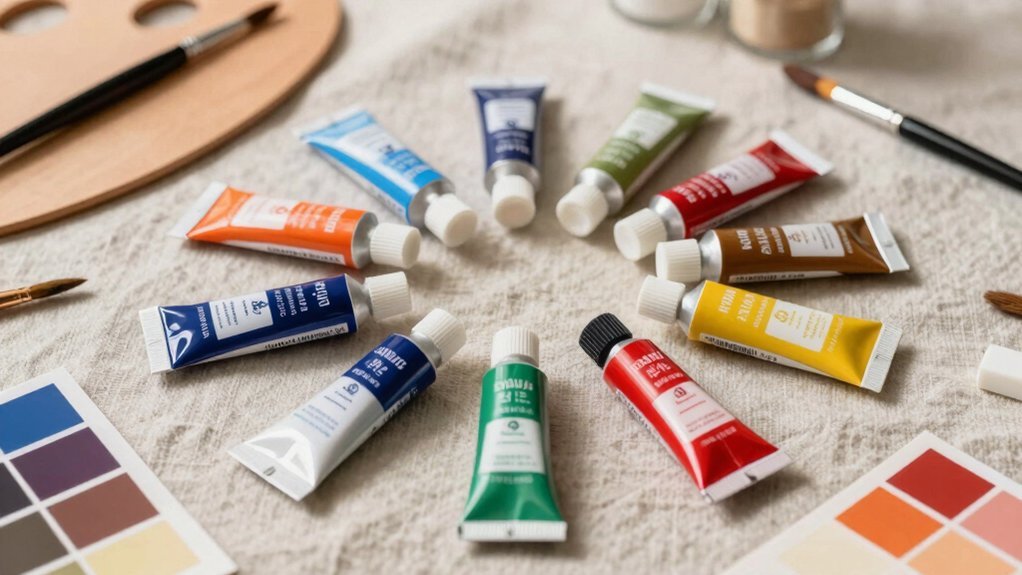
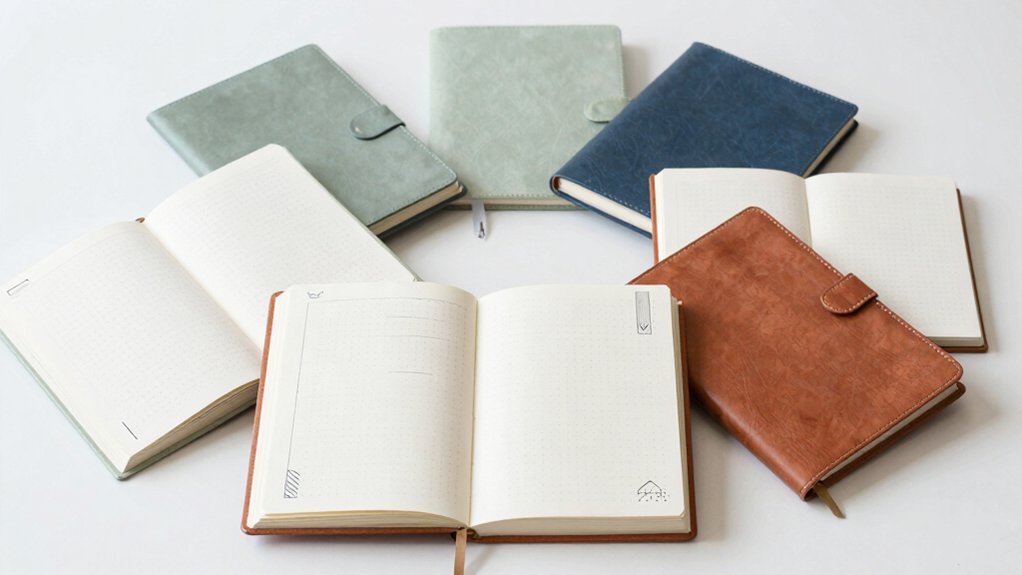
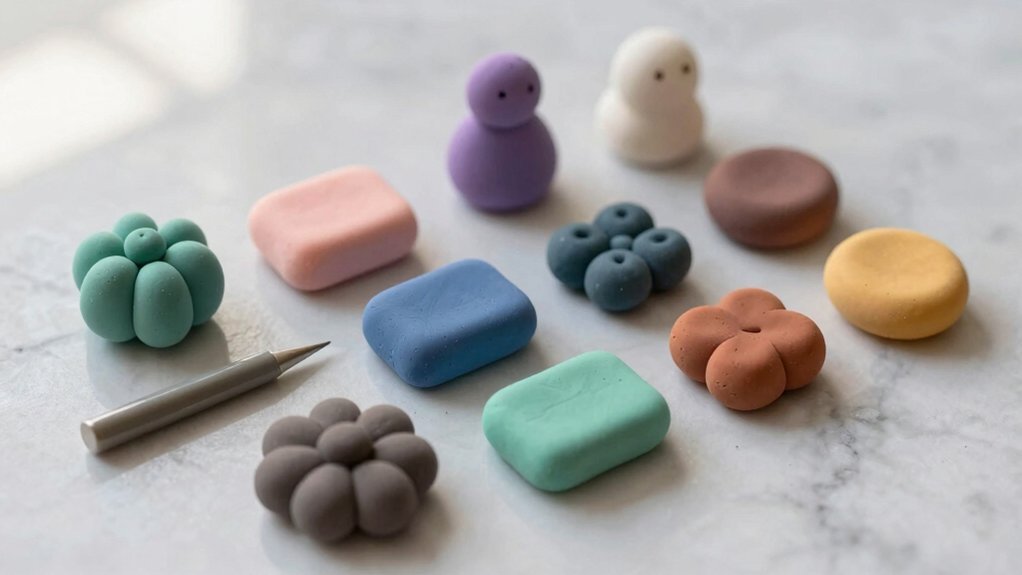
Leave a Reply